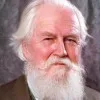Oh cat; I’d say, or pray: be-ooootiful cat! Delicious cat! Exquisite cat! Satiny cat! Cat like a soft owl, cat with paws like moths, jeweled cat, miraculous cat! Cat, cat, cat, cat.
Doris Lessing (1919-2013) British author, biographer, playwright [b. Doris May Tayler]
Particularly Cats, ch. 5 (1967)
(Source)
Quotations about:
cat
Note not all quotations have been tagged, so Search may find additional quotes on this topic.
She has frolicsome moods, in which a thimble, a shoe-buttoner, a scrap of paper, or a piece of string will drive her wild with delight; she has moods of inflexible gravity, in which she stares solemnly at her favorite ball rolling over the carpet, without stirring one lazy limb to reach it. “Have I seen this foolish toy before?” she seems to be asking herself with musing austerity; “and can it be possible that there are cats who run after such frivolous trifles? Vanity of vanities, and all is vanity, save only to lie upon the hearth-rug, and be warm, and think grave thoughts to feed a serious soul.”
A man who owns a dog is, in every sense of the word, its master; the term expresses accurately their mutual relations. But it is ridiculous when applied to the limited possession of a cat. I am certainly not Agrippina’s mistress, and the assumption of authority on my part would be a mere empty dignity, like those swelling titles which afford such innocent delight to the Freemasons of our severe republic. If I call Agrippina, she does not come; if I tell her to go away, she remains where she is; if I try to persuade her to show off her one or two little accomplishments, she refuses, with courteous but unswerving decision.
If we have a decent sort of cat to begin with, and have always treated it courteously, and aren’t cursed with meddling, bullying natures, it’s a pleasure to let it do as it pleases. With children, this would be wicked and irresponsible, so raising children involves a lot of effort and friction. They need to be taught how to tie their shoes and multiply fractions, they need to be punished for pocketing candy in the grocery store, they need to be washed and combed and forced to clean up their rooms and say please and thank you.
A cat is our relief and our reward.
However long you have a cat and however plainly he lays his life open before you, there is always something hidden, some name he goes by in a place you never heard of.
People who hate cats tend to be proud of the fact, and brag about it as if it proved something honest and straightforward in their natures. Nobody brags about hating dogs. To hate dogs would be meanspirited and peculiarly unpatriotic; dogs are a very American concept, fraternal, hearty, and unpretentious, while cats are inscrutable like the wily Oriental and elitist like the European esthete. In advertising cats turn up selling perfume (wily) and expensive rugs and furniture (elitist) , while dogs sell such solid family values as station wagons, life insurance, and sporting goods.
Very few people have no opinions about cats. Even those who have never known a cat personally, scarcely even spoken to one, feel strongly and sometimes hysterically on the subject.
I love both the way a dog looks up to me and a cat condescends to me.
It’s curious that throughout our history together, with no apparent effort, people have been able to think of the cat simultaneously as the guardian spirit of the hearth and home, and as the emblem of freedom, independence, and rootlessness.
By and large, people who enjoy teaching animals to roll over will find themselves happier with a dog.
A catless writer is almost inconceivable. It’s a perverse taste, really, since it would be easier to write with a herd of buffalo in the room than even one cat; they make nests in the notes and bite the end of the pen and walk on the typewriter keys.
People who wish to salute the free and independent side of their evolutionary character acquire cats. People who wish to pay homage to their servile and salivating roots own dogs.
Anna Quindlen (b. 1953) American journalist, novelist
Article (1991-04-07), “Mr. Smith Goes to Heaven,” New York Times
(Source)
Part of an obituary for her dog, Jason Oliver C. Smith. Reprinted in Thinking Out Loud (1993).
“What, did St. Francis preach to the birds?” asked Kate. “Whatever for? If he really liked birds he would have done better to preach to cats.”
Rebecca West (1892-1983) British author, journalist, literary critic, travel writer [pseud. for Cicily Isabel Fairfield]
This Real Night (1984)
(Source)
That must be why some people like dogs; they can be made to feel guilty about anything, including the sins of their owners. Cats refuse to take the blame for anything — including their own sins.
Elizabeth Peters (1927-2013) American author [pseud. of Barbara Mertz, who also wrote as Barbara Michaels]
Trojan Gold (1987)
(Source)
Dogs want only love but cats demand worship.
When there was room on the ledge outside of the pots and boxes for a cat, the cat was there — in sunny weather — stretched at full length, asleep and blissful, with her furry belly to the sun and a paw curved over her nose. Then that house was complete, and its contentment and peace were made manifest to the world by this symbol, whose testimony is infallible. A home without a cat — and a well-fed, well-petted, and properly revered cat — may be a perfect home, perhaps, but how can it prove title?
Mark Twain (1835-1910) American writer [pseud. of Samuel Clemens]
The Tragedy of Pudd’nhead Wilson, ch. 1 (1894)
(Source)
For I will consider my Cat Jeoffry.
For he is the servant of the Living God duly and daily serving him.
For at the first glance of the glory of God in the East he worships in his way.
For this is done by wreathing his body seven times round with elegant quickness.
Unlike a human smile, purring cannot be, as far as anyone knows, faked.
Jeffrey Moussaieff Masson (b. 1941) American author
The Nine Emotional Lives of Cats, ch. 3 (2002)
(Source)
The cat does not merely experience contentment, he exudes it. You cannot be in the presence of a contented cat and not have some of that contentment rub off on you. Which surely is a good part of the reason we love cats so.
Jeffrey Moussaieff Masson (b. 1941) American author
The Nine Emotional Lives of Cats: A Journey Into the Feline Heart, ch. 3 (2002)
(Source)
Throw a stick, and the servile dog wheezes and pants and shambles to bring it to you. Do the same before a cat, and he will eye you with coolly polite and somewhat bored amusement.
H. P. Lovecraft (1890-1937) American fabulist [Howard Phillips Lovecraft]
“Cats and Dogs” (23 Nov 1926), Leaves (Summer 1937)
(Source)
Reprinted as "Something about Cats" in Something About Cats: And Other Pieces (1949) [ed. Derleth].
Nothing’s more playful than a young Cat, nor more grave than an old One.
Thomas Fuller (1654-1734) English physician, preacher, aphorist, writer
Gnomologia: Adages and Proverbs (compiler), # 3680 (1732)
(Source)
The kitten has a luxurious, Bohemian, unpuritanical nature. It eats six meals a day, plays furiously with a toy mouse and a piece of rope, and suddenly falls into a deep sleep whenever the fit takes it. It never feels the necessity to do anything to justify its existence; it does not want to be a Good Citizen; it has never heard of Service. It knows that it is beautiful and delightful, and it considers that a sufficient contribution to the general good. And in return for its beauty and charm it expects fish, meat, and vegetables, a comfortable bed, a chair by the grate fire, and endless petting.
Robertson Davies (1913-1995) Canadian author, editor, publisher
The Diary of Samuel Marchbanks, ch. 20 (1947)
(Source)
Perhaps God made cats so that man might have the pleasure of fondling the tiger ….
Robertson Davies (1913-1995) Canadian author, editor, publisher
The Diary of Samuel Marchbanks, ch. 20 (1947)
(Source)
If a fish is the movement of water embodied, given shape, then cat is a diagram and pattern of subtle air.
Doris Lessing (1919-2013) British author, biographer, playwright [b. Doris May Tayler]
Particularly Cats, ch. 2 (1967)
(Source)
I said something which gave you to think I hated cats. But gad, sir, I am one of the most fanatical cat lovers in the business. If you hate them, I may learn to hate you. If your allergies hate them, I will tolerate the situation to the best of my ability.
Lat take a cat, and fostre him wel with milk,
And tendre flesh, and make his couche of silk,
And lat him seen a mous go by the wal;
Anon he weyveth milk, and flesh, and al,
And every deyntee that is in that hous,
Swich appetyt hath he to ete a mous.
Lo, here hath lust his dominacioun,
And appetyt flemeth discrecioun.[Let’s take a cat, and foster him well with milk
And tender meat, and make his couch of silk,
And let him see a mouse go by the wall,
Right then he refuses milk and meat and all,
And every dainty that is in that house,
Such appetite has he to eat a mouse.
Lo, here has lust his domination,
And appetite drives away discretion.]Geoffrey Chaucer (c. 1343-1400) English poet, philosopher, astronomer, diplomat
The Canterbury Tales, “The Manciple’s Tale,” l. 175ff (c. 1400)
(Source)
Modern English. Alternate modernizations:Let take a cat, and foster her with milk
And tender flesh, and make her couch of silk,
And let her see a mouse go by the wall,
Anon she weiveth milk, and flesh, and all,
And every dainty that is in that house,
Such appetite hath she to eat the mouse.
Lo, here hath kind her domination,
And appetite flemeth discretion.
[Source]Let take a cat, and foster her with milk
And tender flesh, and make her couch of silk,
And let her see a mouse go by the wall,
Anon she forsaketh milk, and flesh, and all,
And every dainty that is in that house,
Such appetite hath she to eat the mouse.
Lo, here hath nature her domination,
And appetite drives out discretion.
[Source]
The cat is, above all things, a dramatist; its life is lived in an endless romance, though the drama is played out on quite another stage than our own, and we only enter into it as subordinate characters, as stage managers, or rather stage carpenters.
Margaret Benson (1865-1916) English author and Egyptologist
The Soul of a Cat and Other Stories, “Epilogue,” sec. 2 (1901)
(Source)
If you try and take a cat apart to see how it works, the first thing you have on your hands is a non-working cat.
Douglas Adams (1952-2001) English author, humourist, screenwriter
Speech, Digital Biota 2 conference, Cambridge, UK (Sep 1998)
(Source)
Segments of this impromptu speech are quoted in Richard Dawkins, "Eulogy for Douglas Adams," Church of Saint Martin in the Fields, London (27 Sep 2001). A variant of the quotation ("If you try and take a cat apart to see how it works, you end up with a non-working cat. Do not try this.") is often attributed to that article, but the Dawkins eulogy contains the correct form of the quote.
We own a dog — he is with us as a slave and inferior because we wish him to be. But we entertain a cat — he adorns our hearth as a guest, fellow-lodger, and equal because he wishes to be there. It is no compliment to be the stupidly idolised master of a dog whose instinct it is to idolise, but it is a very distinct tribute to be chosen as the friend and confidant of a philosophic cat who is wholly his own master and could easily choose another companion if he found such an one more agreeable and interesting.
H. P. Lovecraft (1890-1937) American fabulist [Howard Phillips Lovecraft]
“Cats and Dogs” (23 Nov 1926), Leaves (Summer 1937)
(Source)
Reprinted as "Something about Cats" in Something About Cats: And Other Pieces (1949) [ed. Derleth].
If animals could speak as fabulists have feigned, the dog would be a blunt, blundering, outspoken, honest fellow, but the cat would have the rare talent of never saying a word too much.
Philip Gilbert Hamerton (1834-1894) British artist, art critic and author.
Chapters on Animals, ch. 4 “Cats” (1893)
(Source)
Sometimes misattributed to Mark Twain.
When there was room on the ledge outside of the pot s and boxes for a cat, the cat was there — in sunny weather — stretched at full length, asleep and blissful, with her furry belly to the sun and a paw curved over her nose. Then the house was complete, and its contentment and peace were made manifest to the world by this symbol, whose testimony is infallible. A home without a cat — and a well-fed, well-petted, and properly revered cat — may be a perfect home, perhaps, but how can it prove title?
Mark Twain (1835-1910) American writer [pseud. of Samuel Clemens]
Pudd’nhead Wilson, ch. 1 (1894)
(Source)
Confront a child, a puppy, and a kitten with a sudden danger; the child will turn instinctively for assistance, the puppy will grovel in abject submission, the kitten will brace its tiny body for a frantic resistance.
H. H. Munro (1870-1916) Scottish writer [Hector Hugh Munro; pseud. Saki]
“The Achievement of the Cat” (1924)
(Source)
The vanity of man revolts from the serene indifference of the cat.
Cats are autocrats of naked self-interest. They are both amoral and immoral, consciously breaking rules. Their “evil” look at such times is no human projection: the cat may be the only animal who savors the perverse or reflects upon it.
Camille Paglia (b. 1947) American feminist academic and social critic
Sexual Personae, ch. 2 (1990)
(Source)
The domestic cat is a contradiction. No animal has developed such an intimate relationship with mankind, while at the same time demanding and getting such independence of movement and action.
Desmond Morris (b. 1928) English zoologist, ethologist, author
Catwatching, Introduction (1986)
(Source)
If you are allergic to a thing, it is best not to put that thing in your mouth, particularly if the thing is cats.
Lemony Snicket (b. 1970) American author, screenwriter, musician (pseud. for Daniel Handler)
The Wide Window (2000)
(Source)
The cat is a dilettante in fur.
Théophile Gautier (1811-1872) French poet, writer, critic
Ménagerie Intime, ch. 1 “Temps Anciens” (1864)
(Source)
Paraphrase of an anecdote about his cat, Madame Théophile, who would lay a paw on a visiting singer's lips if a certain high note were sung, often tested by guests: "The dilettante in fur was not to be deceived." [Il était impossible de tromper sur la note cette chatte dilettante.]
Excerpted in Champfleury, The Cat, Past and Present, "Supplementary Notes by the Translator" (1869) [tr. Hoey (1885)]
Before a Cat will condescend
To treat you as a trusted friend,
Some little token of esteem
Is needed, like a dish of cream.T. S. Eliot (1888-1965) American-British poet, critic, playwright [Thomas Stearns Eliot]
Old Possum’s Book of Practical Cats, “The Ad-dressing of Cats” (1939)
(Source)
I love in the cat that independent and almost ungrateful temper which prevents him from attaching himself to anyone; the indifference with which he passes from the salon to the housetop. When you caress it, it stretches itself out and arches its back, indeed; but that is caused by physical pleasure, not, as in the case of the dog, by a silly satisfaction in loving and being faithful to a master who returns thanks in kicks. The cat lives alone, has no need of society, does not obey except when it likes, and pretends to sleep that it may see the more clearly, and scratches everything that it can scratch.
[J’aime dans le chat, ce caractère indépendant et presque ingrat qui le fait ne s’attacher à personne, cette indifférence avec laquelle il passe des salons à ses gouttières natales; on le caresse, il fait gros dos; mai c’est un plaisir physique qu’il éprouve, et non, comme le chien, une niaise satisfaction d’aimer et d’être fidèle à un maître qui l’en remercie à coups de pied. Le chat vit seul, il n’a nul besoin de société, il n’obéit que quand il veut, fait l’endormi pour mieux voir, et griffe tout ce qu’il peut griffer.]
François-René de Chateaubriand (1768-1848) French writer, politican, diplomat
In Comte de Marcellus, Chateaubriand et son Temps (1859)
(Source)
I never saw an author in my life — saving perhaps one — that did not purr as audibly as a full-grown domestic cat on having his fur smoothed the right way by a skillful hand.
It’s a cat, singular. A solitary diurnal ambush hunter with good hearing and binocular vision and a predilection for biting the neck of its prey in half while disemboweling it with the scythe-like claws on its hind legs. Basically it’s a velociraptor with a fur coat and an outsize sense of entitlement.
After we do the washing-up, I get to spend the rest of the evening reading FAQs on cat maintenance on the web. It takes about half an hour to come to the unwelcome realization that they’re almost as complex as home-brew gaming PCs, and have even more failure modes. (When your gaming PC malfunctions it doesn’t stealthily dump core in your shoes.)
It doesn’t matter whether the cat is black or white, as long as it catches mice.
[T]he behaviour of the cat was somewhat peculiar. It was soon noticed that when there was work to be done the cat could never be found. She would vanish for hours on end, and then reappear at meal-times, or in the evening after work was over, as though nothing had happened. But she always made such excellent excuses, and purred so affectionately, that it was impossible not to believe in her good intentions.
George Orwell (1903-1950) English writer [pseud. of Eric Arthur Blair]
Animal Farm, ch. 3 (1945)
(Source)
Look, I tried the cat experiment. On the third trial, the cat was dead. On each of the subsequent 413 trials, it remained dead. Am I doing something wrong?
James Nicoll (b. 1961) Canadian reviewer, editor
“SCHRODINGER’S CAT??” sci.physics, Usenet (11 Mar 1992)
(Source)
Macavity, Macavity, there’s no one like Macavity,
There never was a Cat of such deceitfulness and suavity.
He always has an alibi, and one or two to spare;
At whatever time the deed took place — MACAVITY WASN’T THERE!
When I play with my cat, who can say that it is not she amusing herself with me more than I with her?
[Quand je me jouë à ma chatte, qui sçait, si elle passe son temps de moy plus que je ne fay d’elle?]
Michel de Montaigne (1533-1592) French essayist
“Apology for Raymond Sebond [Apologie de Raimond de Sebonde]” (1588–1592), Essays, Book 2, ch. 12 (1595) [tr. Ives (1925)]
(Source)
(Source (French)). Alternate translations:When I am playing with my Cat, who knowes whether she have more sporte in dallying with me, then I have in gaming with hir?
[tr. Florio (1603)]When I play with my cat, who knows whether puss is not more diverted with me than I am with puss?
[tr. Cotton (1686)]When I play with my cat who knows whether I do not make her more sport than she makes me?
[tr. Cotton/Hazlitt (1877)]When I play with my cat, who knows if I am not a pastime to her more than she is to me.
[tr. Frame (1943)]When I play with my cat, how do I know that she is not passing time with me rather than I with her?
[tr. Screech (1987)]
His movements could be called cat-like, except that he did not stop to spray urine up against things.
Cats seem to go on the principle that it never does any harm to ask for what you want.
Joseph Wood Krutch (1893-1970) American educator, writer, critic, naturalist
The Twelve Seasons, “February” (1949)
(Source)









































